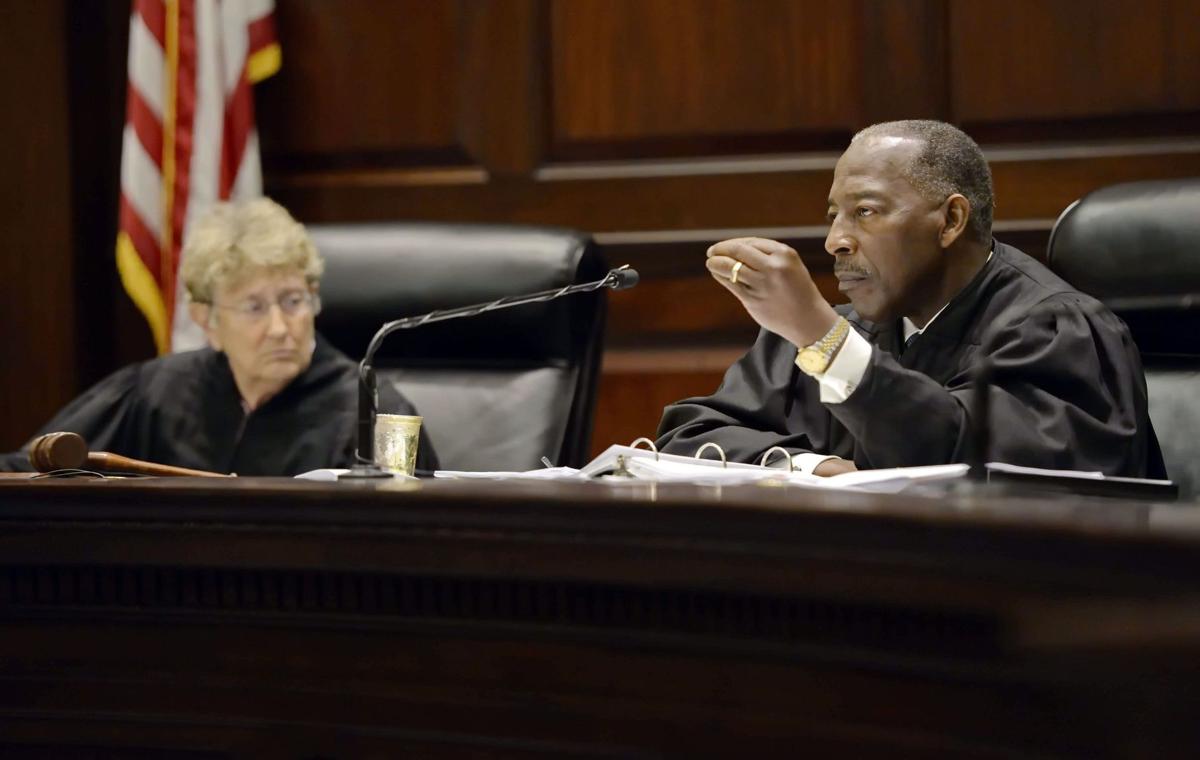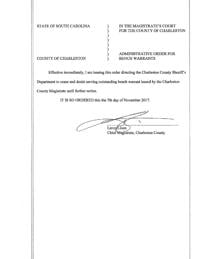
Instructions from S.C. Supreme Court Chief Justice Donald Beatty (right) has prompted magistrate-level courts statewide to recall arrest warrants.
Tens of thousands of South Carolinians wanted for arrest for skipping court dates or blowing off fines might be breathing a sigh of relief as judges have stopped jailing some of these low-level offenders under instructions from the state’s chief justice.But the move has stirred a fear that prolonging their freedom will jeopardize victims of their crimes, which include domestic violence. Some judges also reportedly feel threatened with a jail sentence of their own if they run afoul of the new directive. And some authorities worry that the move will embolden people to skip their court dates altogether.
In the past, people who fail to pay fines or don't show up for trial on certain misdemeanors or traffic tickets have been captured and put behind bars, sometimes until their bills are paid or their maximum jail terms are served. But advocates said the practice turned jails into “debtors' prisons.”
Supreme Court Chief Justice Donald Beatty has taken steps recently to address such concerns, particularly when impoverished people are convicted and incarcerated without ever being told of their right to have an attorney defend them.
Scores of arrest warrants statewide are being recalled as a result, even though Beatty has yet to issue a formal written order on the practice. Many summary courts, which include county magistrates and municipal judges from the Lowcountry to the Upstate, have suspended all arrests on bench warrants as they scramble to figure out which cases are affected.
Beatty's instructions do not apply to the most serious misdemeanors and felonies that are handled in circuit court.
But in Horry County, about 230 bench warrants from domestic violence cases and jury trials are among the 7,500 being recalled, sheriff's Sgt. Timmy Tyner said. More than 4,600 stem from traffic violations.
In Charleston and Greenville counties, law officers were told not to serve any of the thousands of pending bench warrants from magistrates and city judges, authorities there said, as they tally exactly how many cases are affected.
Charleston County Chief Magistrate Leroy Linen on Tuesday also ordered summary court judges to recall all bench warrants until further notice.
Courts statewide have long convicted people without hearing any evidence, simply because the defendants didn’t show up, Linen said. It's time for courts to make sure those people know of their right to an attorney before putting them behind bars, he said. Jail time can strip them of jobs, while boosting costs for the counties that keep them behind bars, Linen said.
“There is so much collateral damage from jailing them,” he said. “We had been doing this practice all over the state, and nobody was saying anything. … (The chief justice) was trying to impress upon everyone that we must … give people their due process rights.”
Beatty issued the instructions Nov. 1 during a mandatory training session in Columbia for summary court judges. While Linen and other judges said they took the directions to heart, others saw his words as a threat.
The justice explained that violating someone's constitutional rights is an offense and that there are consequences for an offense, Linen said.
The weight of Beatty’s words became quickly apparent statewide with thousands of bench warrants being recalled.
But Charleston County Sheriff Al Cannon said warrants are a routine mechanism to ensure defendants show up, aiding the court's efficiency.
There may be other unforeseen consequences, he said.
“Some of these cases may also have victims, and they will have to be notified,” Cannon said. “There are a lot of ramifications. It can’t simply be a swipe of the pen and you take these warrants off the books.”
Lindsey Jacobs, attorney for the S.C. Victim Assistance Network, praised efforts to fix problems in the courts.
“But their errors on the front end are making the victims suffer now,” she said. “This is just an opportunity for perpetrators to stay at large and possibly harm the person who got them brought to court in the first place.”
'Reminder of the law'
Issues with South Carolina’s summary courts were brought to light in the past year, largely through studies by the National Association of Criminal Defense Lawyers and the American Civil Liberties Union.
They said many of the state’s lowest courts were routinely failing to inform defendants of their Sixth Amendment right to a lawyer and a public defender, a requirement when jail time is a possible punishment. The ACLU followed up with lawsuits against Lexington County, Beaufort and Bluffton, where they said court systems breed "modern-day debtors' prisons."
Beatty on Sept. 15 distributed a memo to judges in such courts statewide, decrying reported violations of the right to counsel. He said any defendants who couldn’t be provided a lawyer can only be fined, not jailed. The same directive applied to anyone convicted while absent at trial if they hadn't already been informed of their rights.
“I am mindful of the constraints that you face in your courts,” Beatty said in that memo, “but these principles of due process to all defendants who come before you cannot be abridged.”
Full article here: Thousands of arrest warrants for low-level offenders recalled under directive from South Carolina's chief justice
